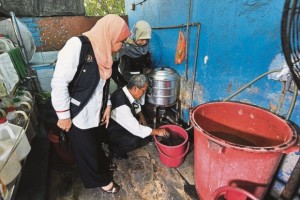 Department director Datuk Dr Narimah Nor Yahya said Ops Premis Makanan was launched as part of efforts to address the disease.
Department director Datuk Dr Narimah Nor Yahya said Ops Premis Makanan was launched as part of efforts to address the disease.
“To date, our task force has inspected 160 premises in Kuala Lumpur and 10 were shut down for failing inspection guidelines as outlined by the Food Act 1983 and Food Act 2009,” she said.
Speaking during a surprise inspection of a popular hawker centre in Kampung Baru, Dr Narimah appealed to the public to be mindful of where they eat.
Workers at the hawker centre were seen scrambling to clear mounds of dirty dishes and hurriedly washing the floor of their kitchen areas.
Two stalls were served with closure notices for failing to meet spection standards.
Blood samples and contact details of all foreign workers employed at the centre were also collected.
She said it was unacceptable for ice cubes to be stored in dirty open containers and for workers to use their bare hands to handle ice.
“Look at the flies buzzing around the raw meat. This place is definitely getting closed,” she said of one eatery, adding that if any workers were not vaccinated for typhoid, charges would be brought against the employer.
“It is mandatory for restaurant or hawker centre operators to have all their workers vaccinated,” she said.

 “hawking.” That’s the legal term.
“hawking.” That’s the legal term.